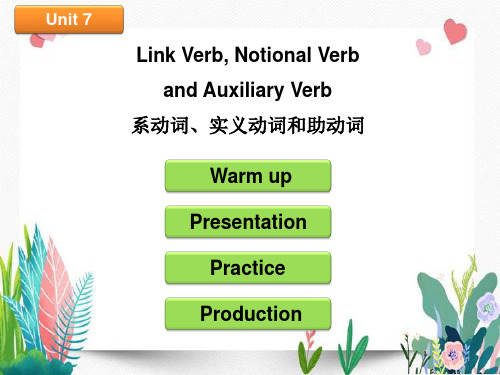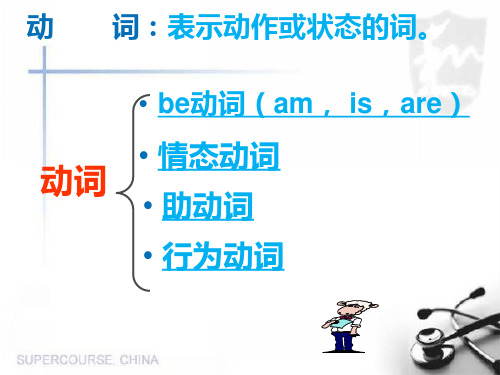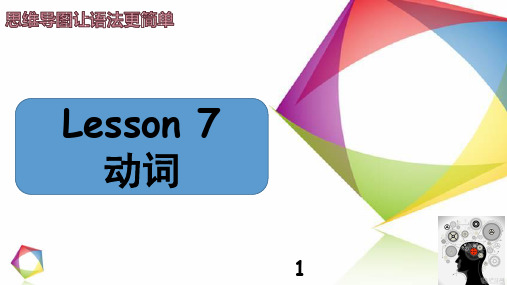小学英语动词[优质ppt]
合集下载
小学动词ppt课件(2024)

2024/1/30
can/could
表示可能的推测,如“It
could
be
rainy
tomorrow.”(明天可能
会下雨。)
may/might
表示不太肯定的推测,如 “She might not come to the party.”(她可能 不来参加聚会。)
27
06
动词短语和固定搭配
Chapter
如“喜欢跑步”、“开始唱歌” 等,两个动词连用表示一个动作 接着另一个动作发生。
7
02
小学阶段常用动词
Chapter
2024/1/30
8
表示动作行为动词
走、坐、看、听、打、拿、批评 、宣传、保卫、学习(动作行为
动词)
踢、踹、叩、舔、哭、笑、打骂 、动弹(表示身体动作的动词)
进行、开始、停止、禁止(表示 动作变化的动词)
动词在句子中起着核心作用,能够表达主语的行为、动 作或状态。
动词的时态、语态和语气等变化能够表达不同的时间和 情感色彩。
2024/1/30
4
动词分类与举例
表示主语状态或特征的动词,如 是、有、变成等。
表示说话人对动作或状态的情感 或态度,如应该、必须、可能等 。
2024/1/30
实义动词 系动词 助动词
05
表示格言或警句中。
06
例如:Pride goes before a fall. 骄者必 败。
14
现在进行时及用法
习惯进行
表示长期的或重复性的动作,说 话时动作未必正在进行。
例如
Mr. Green is writing another
novel. 他在写另一部小说。(说 话时并未在写,只处于写作的状
can/could
表示可能的推测,如“It
could
be
rainy
tomorrow.”(明天可能
会下雨。)
may/might
表示不太肯定的推测,如 “She might not come to the party.”(她可能 不来参加聚会。)
27
06
动词短语和固定搭配
Chapter
如“喜欢跑步”、“开始唱歌” 等,两个动词连用表示一个动作 接着另一个动作发生。
7
02
小学阶段常用动词
Chapter
2024/1/30
8
表示动作行为动词
走、坐、看、听、打、拿、批评 、宣传、保卫、学习(动作行为
动词)
踢、踹、叩、舔、哭、笑、打骂 、动弹(表示身体动作的动词)
进行、开始、停止、禁止(表示 动作变化的动词)
动词在句子中起着核心作用,能够表达主语的行为、动 作或状态。
动词的时态、语态和语气等变化能够表达不同的时间和 情感色彩。
2024/1/30
4
动词分类与举例
表示主语状态或特征的动词,如 是、有、变成等。
表示说话人对动作或状态的情感 或态度,如应该、必须、可能等 。
2024/1/30
实义动词 系动词 助动词
05
表示格言或警句中。
06
例如:Pride goes before a fall. 骄者必 败。
14
现在进行时及用法
习惯进行
表示长期的或重复性的动作,说 话时动作未必正在进行。
例如
Mr. Green is writing another
novel. 他在写另一部小说。(说 话时并未在写,只处于写作的状
小学英语语法be动词 ppt课件

They are my friends. 变否 They are beautiful.
They are not my friends. They are not beautiful.
练习
1.His brother is a teacher. 否定句: 2.Those are his parents. 否定句: 3.I’m 14 years old. 否定句: 4.The ruler is on the table. 否定句:
含be动词的一般疑问句:be提句首
感
感谢
谢阅
阅 读
读
含be动词的一般疑问句:be提句首
f
We are students.
Are you students? You are girls. Are you girls?
They are friends Are they friends?
第一人称变第二人称
be 动词提前,首字母大写, 其他部分照抄,句号变问号。
=She’s my mother. =He’s my father. =It’s my dog.
She is a teacher. =She's a teacher.
She is beautiful. =She's beautiful.
he/she/it is
He
His father is tall and strong.
3. He is a good boy at home.
7.They are in the teacher's office.
一疑:Is he a good boy at home? 一疑:Are they in teacher's office?
动词(共55张PPT)

表示状态的系动 表示主语所处的状
词 态
be
表示持续的系动 表示主语继续或保 词 持某种身份或状态
keep; remain;
stay;
lie
stand;
类别 表示感官的 系动词
功能
例词
look; feel;
表示人体感官的动作 smell; taste; sound
表 示 状 态 变 表示主语从一种状态 become; get; 化的系动词 变换到另一种状态 go; grow; turn
【解析】考查动词短语辨析。句意为:当你参观
博物馆时你应该 ____ 指示并且不要违反它们。
compare with比较;look forward to期望;pay
attention to注意;try out试验。将选项代入语境
进行分析可知只有C项符合。故选C。
第三节 情态动词
考点精讲
could:2012 年黔东南州 38 题考查; must: 近 4 年共考 查3次;have to:2012年遵义30题考查,2011年安顺30 近4年共考查4次;need:近4年共考查6次) 情态动词本身有一定的意义,但不能独立作谓
得好。 The little girl is singing an English song. 小女孩正 在唱一首英文歌。
(3)易混淆的近义动词辨析
① watch, look, see与 read (见第一部分课时七
(上)Units 1-2) ②speak, tell, talk 与 say ( 见第一部分课时七 (下)Unit 5) ③pay, spend, cost 与 take ( 见第一部分课时七
选C。
3.I___an article about first aid. It’s
be动词小学英语-ppt课件

19)My sister's name __is____Nancy.
20)__A_r_e__ David and Helen from England?
21)There __is____ a girl in the room. 22)There __a_r_e__ some apples on the tree.
2023最新整理收集 do something
英语中的Be动词
be动词小学英语
1
be动词小学英语
2
I He /She/It
am is 单数
We/ They/ You
are 复数
be动词小学英语
3
我用am, 你用are, is用在他她它, 复数全用are
be动词小学英语
4
am/ is的过去式是 was are的过去式是 were
be动词小学英语
5
一、用be(is, am,are)动词的适当形式填空。 1)I __a_m___ a boy. __A_r_e__ you a boy? No, I __a_m__ not. 2)The girl___is___ Jack's sister. 3)The dog __is_____ tall and fat. 4)The man with big eyes ___is____ a teacher. 5)__Is____ your brother in the classroom? 6)How __i_s____ your father? 7)Mike and Liu Tao _a_r_e___ at school. 8)Whose dress __is____ this? 9)Whose socks _a_r_e___ they? his. 10)Who __a_m___ I?
小学英语语法动词ppt课件

4
I love my father.
love
They have an apple.
have
We make a cake.
make
You clean the room.
clean
The pupils sweep the floor. sweep
实 义 动 词
5
实义动词又可分为 及物动词 和 不及物动词 两类。
1.及物动词,后边可以直接接宾语。如:
Judy found a Christmas gift in the stocking.
朱迪在沭子里找到了圣诞礼物。
We ate Sue's birthday cake .
我们吃了苏的生日蛋糕。
2.不及物动词,不需要宾语。如:
The car stopped . 车停了。
cut切
cutting
run跑
running
nod点头
nodding
26
27
13
I can swim.
can
They can play basketball. can She may be a good pupil. may
They may go to the park .may
It must rain.
must
You must get up.
must
情态 动词
14
动词的基本形式
11
情态动词
表示说话人的语气或情态。情态动词词义不 完全,不能单独作谓语,只能与动词原形一 起构成谓语。 情态动词有shall,should,will,would,can,could , may , might , must , dare , need , ought to 等。 如:
I love my father.
love
They have an apple.
have
We make a cake.
make
You clean the room.
clean
The pupils sweep the floor. sweep
实 义 动 词
5
实义动词又可分为 及物动词 和 不及物动词 两类。
1.及物动词,后边可以直接接宾语。如:
Judy found a Christmas gift in the stocking.
朱迪在沭子里找到了圣诞礼物。
We ate Sue's birthday cake .
我们吃了苏的生日蛋糕。
2.不及物动词,不需要宾语。如:
The car stopped . 车停了。
cut切
cutting
run跑
running
nod点头
nodding
26
27
13
I can swim.
can
They can play basketball. can She may be a good pupil. may
They may go to the park .may
It must rain.
must
You must get up.
must
情态 动词
14
动词的基本形式
11
情态动词
表示说话人的语气或情态。情态动词词义不 完全,不能单独作谓语,只能与动词原形一 起构成谓语。 情态动词有shall,should,will,would,can,could , may , might , must , dare , need , ought to 等。 如:
【小升初英语专题】——动词形式类 精品讲解课件(共24张PPT)

特殊情况特殊记,has does goes。
Language points
过去式多由动词原形加-ed构成,这类动词被称为规则动词。动词过去式的构成方
法如下:
类别
构成方法
例词
一般情况
加-ed
watch-watched
以e结尾
加-d
skate-skated
以“辅音字母+y”结尾 把y为i,再加ed study-studied try-tried
解析:have的第三人称单数形式为has,故填has。
Practice
真题演练:按要求写单词。 3.read(原形)______________r_e_a_d_______________ 解析:read的原形与过去式相同,故填read。
Practice
真题演练:按要求写单词。 4.flew(原形)______________f_ly_________________ 解析:flew是动词fly的过去式,故填fly。
B.has;likes
C. has; like
(A)6. What time will he _________ back tomorrow?
A. be
B. is
C.am
(C )7. Nancy __________ do well in Chinese. She needs some help.
A. don't
hurt -- hurt learn -- learnt/learned
meet -- met ......
妙记口诀
动词的过去式口诀
过去式构成有规律,一般词尾加-ed; 如果词尾有个e,只要直接加上-d; “辅音+y”在词尾,把y变i加-ed; “一辅重闭”作尾巴,双写之后加-ed; 过去式不规则变化,需要特殊记。
Language points
过去式多由动词原形加-ed构成,这类动词被称为规则动词。动词过去式的构成方
法如下:
类别
构成方法
例词
一般情况
加-ed
watch-watched
以e结尾
加-d
skate-skated
以“辅音字母+y”结尾 把y为i,再加ed study-studied try-tried
解析:have的第三人称单数形式为has,故填has。
Practice
真题演练:按要求写单词。 3.read(原形)______________r_e_a_d_______________ 解析:read的原形与过去式相同,故填read。
Practice
真题演练:按要求写单词。 4.flew(原形)______________f_ly_________________ 解析:flew是动词fly的过去式,故填fly。
B.has;likes
C. has; like
(A)6. What time will he _________ back tomorrow?
A. be
B. is
C.am
(C )7. Nancy __________ do well in Chinese. She needs some help.
A. don't
hurt -- hurt learn -- learnt/learned
meet -- met ......
妙记口诀
动词的过去式口诀
过去式构成有规律,一般词尾加-ed; 如果词尾有个e,只要直接加上-d; “辅音+y”在词尾,把y变i加-ed; “一辅重闭”作尾巴,双写之后加-ed; 过去式不规则变化,需要特殊记。
英语动词及动词短语ppt课件

动词短语
9.call +介词/副词的短语:
• call after • 以---命名 • call back • 召回
• call up • 征召入伍,给某人打电 话,使想起
• call on • 号召,拜访某人 • call in • 召集 • call off • 取消
认识到了贫困户贫困的根本原因,才 能开始 对症下 药,然 后药到 病除。 近年来 国家对 扶贫工 作高度 重视, 已经展 开了“ 精准扶 贫”项 目
• 进来 • 来自于 • 产生 • 过来 • 出来,出现,出版 • 从旁经过 • 上来,走进 • 偶遇 • 跟着---来 • 回来 • 恢复知觉,回来 • 下来,倒塌
认识到了贫困户贫困的根本原因,才 能开始 对症下 药,然 后药到 病除。 近年来 国家对 扶贫工 作高度 重视, 已经展 开了“ 精准扶 贫”项 目
动词短语
16.take +介词/副词的短语:
• take away
• 拿走
• take down
• 写下,记下
• take in
• 欺骗;吸收,吸纳
• take off
• 起飞;脱下
• take on
• 承担;呈现;开始雇佣
• take over
• 接收,接管
• take pictures
• 照相
• take care of
认识到了贫困户贫困的根本原因,才 能开始 对症下 药,然 后药到 病除。 近年来 国家对 扶贫工 作高度 重视, 已经展 开了“ 精准扶 贫”项 目
动词短语
13.give +介词/副词的短语:
• give up • 放弃 • give in • 屈服,投降
动词PPT课件

被动语态的构成
be动词+动词的过去分词 。例如:The book was written by him.(这本书 是他写的。)
03
动词不定式与动名词
不定式概念及形式
概念
不定式是动词的一种非谓语形式,表 示一种未完成的或将来的动作,由 “to + 动词原形”构成。
形式
不定式有一般式(to do)、完成式( to have done)和进行式(to be doing)三种形式,分别表示不同的 时间概念。
情态动词没有人称和数的变化 ,但有些情态动词有过去式的 变化。
can/could, may/might, must等情态动词用法
can/could 表示能力、可能性、允许或请求。例如
I can swim.(我会游泳。)Could you help me?(你能帮我吗?)
may/might 表示允许、可能或祝愿。例如
虚拟语气是一种特殊的动词形式,用来表示说话人的主观愿望、假设或建议等,而不是客观 事实。
虚拟语气的基本形式包括与现在事实相反的虚拟、与过去事实相反的虚拟和与将来事实相反 的虚拟。
虚拟语气的形式包括基本形式和倒装形式,其中倒装形式用于省略if的条件句中。例如:If I were you, I would go.(如果我是你,我会去的。)Had you come yesterday, you would have seen him.(如果你昨天来的话,你就会见到他了。)
walked to school yesterday.( 她昨天步行去学校。)
将来时
表示将来某个时间将要发生的动 作或存在的状态。例如:They will visit their grandparents next week.(他们下周将去看望
小学英语小学英语语法课件-系动词、实义动词和助动词 (共30张PPT) 全国通用

否定句:
主语+助动词do/does+not+实义动 I don’t like fruit.
词原形+其他
主语+主动动词not+动词形式+其他 He won’t go fishing.
句 型 结 构
一般疑问句:
助动词Do/Does+主语+实义动词原 形+其他? 助动词+主语+动词形式+其他?
Do you like fruit? Have you ever read this book?
Practice Oral Practice
— ____D_id_____ your brother go shopping last night? — No, he ____d_i_d____ (do) his homework at home. I ___h_a_v_e___ ____b_e_e_n____ (be) to Disney twice.
Presentation Grammar Box
系动词be的句型结构
肯定句:主语+系动词be+其他 He is a police officer. 他是一名警察。
句 否定句:主语+be+not+其他 型
He is not a police officer. 他不是警察。
结 一般疑问句:Be+主语+其他? Is he a police officer?
_tr_a__n_s_f_e__r,__b_e__c_a_m__e__________________________________ 助动词:_w_i_ll_, _h_a_v_e_n_’t_,_s_h_o_u_l_d_,_d_o_e_s_,_d_i_d_n_’t_____________
动词讲解ppt课件

形式
动词原形或第三人称单数 形式
用法
描述经常性、习惯性或现 在的动作和状态
9
过去时
2024/1/26
定义
01
表示过去某个时间发生的动作或存在的状态
形式
02
动词过去式
用法
03
描述过去某个时间点的动作和状态
10
将来时
定义
表示将来某个时间要发生的动作 或存在的状态
2024/1/26
形式
will/shall+动词原形或be going to+动词原形
02
03
04
二者都是动词的非谓语形式, 不能独立作谓语。
二者都具有名词的性质,可以 在句子中作主语、宾语等。
在某些情况下,二者可以互换 使用,表达相同的含义。
19
04
情态动词与助动词
Chapter
2024/1/26
20
情态动词概述
定义
情态动词是一种用来表示 说话人的情感、态度、意 愿或可能性的动词。
2024/1/26
15
动名词概念及形式
概念
动名词是动词的一种非谓语形式,具 有名词的性质,可以在句子中作主语 、宾语等。
形式
动名词由动词原形加词尾-ing构成。 与现在分词形式相同,但没有现在分 词的动作正在进行或主动的含义。
2024/1/26
16
不定式和动名词的区别与联系
2024/1/26
性质不同
情态动词的疑问形式
将情态动词提到句首即可构成 疑问句。例如:“Can he do it?”(他能做到吗?)
23
情态动词与助动词的缩写 形式
在口语中,情态动词和助动词 经常缩写在一起。例如: “He’s got to go.”(他得 走了。)这里的“He’s got to”是“He has got to”的缩 写形式。
小学英语六年级动词ppt课件

一般现在时:do, does(用于第三 人称单数),do用于其他人称,
一般过去时:did
I don’t like English.
填空
1
1、 Do you like this magazine? 2、-What doesshe do at the weekends?
-She usually plays games with her friends.
注意:
(1)在一般现在时中,does用于第三人称 单数,其余一律用助动词do。
(2)助动词do,does,did后用动词原形。
为深入学习习近平新时代中国特色社 会主义 思想和 党的十 九大精 神,贯彻 全国教 育大会 精神,充 分发挥 中小学 图书室 育人功 能
助动词do
根据时态、主语人称、数的变化, do/ does/ did,
行为动词又称实义动词,表示动 作和状态
He speaksEnglish very well. 他英语讲得很好。
动词的基本形式 为深入学习习近平新时代中国特色社会主义思想和党的十九大精神,贯彻全国教育大会精神,充分发挥中小学图书室育人功能
原形 第三人称单数形式+s/es 现在分词+ing 过去式+ed
动 词:表示动作或状态的词。
• be动词(am, is,are)
动词 • 情态动词
• 助动词 • 行为动词
be动词 be动词:am,is,are, was, were be动词的否定形式: am not(没有缩略形式) are not=aren’t ,is not=isn’t 主语第一人称+am 主语第二人称+are 单数+is;复数+are
第三人称单数形式的变化
一般过去时:did
I don’t like English.
填空
1
1、 Do you like this magazine? 2、-What doesshe do at the weekends?
-She usually plays games with her friends.
注意:
(1)在一般现在时中,does用于第三人称 单数,其余一律用助动词do。
(2)助动词do,does,did后用动词原形。
为深入学习习近平新时代中国特色社 会主义 思想和 党的十 九大精 神,贯彻 全国教 育大会 精神,充 分发挥 中小学 图书室 育人功 能
助动词do
根据时态、主语人称、数的变化, do/ does/ did,
行为动词又称实义动词,表示动 作和状态
He speaksEnglish very well. 他英语讲得很好。
动词的基本形式 为深入学习习近平新时代中国特色社会主义思想和党的十九大精神,贯彻全国教育大会精神,充分发挥中小学图书室育人功能
原形 第三人称单数形式+s/es 现在分词+ing 过去式+ed
动 词:表示动作或状态的词。
• be动词(am, is,are)
动词 • 情态动词
• 助动词 • 行为动词
be动词 be动词:am,is,are, was, were be动词的否定形式: am not(没有缩略形式) are not=aren’t ,is not=isn’t 主语第一人称+am 主语第二人称+are 单数+is;复数+are
第三人称单数形式的变化
小学语法--动词 ——完美英语语法课件PPT

• do 做 • read 读 • play 玩、踢 • should 应该 • drink 喝 • sing 唱
复习以前学过的动词
• dance 跳舞 • draw 画 • cook 做饭 • swim 游泳 • learn 学习 • want 想要
• send 发送 • move 移动 • live 居住 • am 是 • is 是 • are 是
动词四大家族
复习以前学过的动词
• buy 买 • clean 打扫 • help 帮助 • lost 丢失 • find 找到 • pass 传递
• try 尝试 • go 去 • fly 飞 • eat 吃 • wait 等待
复习以前学过的动词
• know 知道 • will 将要 • speak 说 • finish 完成 • wash 洗 • watch 看
用am, is, are填空。
1、I
a boy.
I not.
you a boy? No,
2、The girl
Jack`s sister.
3、The dog
tall and fat.
4、That
my red skirt.
5、Where at home.
your brother? He
KEY:1、am/ Are/ am。2、is。 3、is。 4、is。
• They_________at school. 5.Tom_________five,he_________not a student.
• Six and four___________ten. I___________good friends.
7.Mary and
• ___________your cousin at home ? 9.I’d like to___________your good friend.
小学英语语法——动词(共18张PPT)

He may be at home. They might come tomorrow.
8
表示必须,否定式为 mustn't,意为“禁止”
We must study hard. You mustn’t play with fire.
must
以must开头的疑问句,肯 定回答用must,而否定回 答则用needn't或don't have to,意为”不需要、不 必”,而不能用mustn't。
12
主观
must强调主观意愿
We must study hard at school.
客观 have to强调客观需要
The sun is setting and I have to go home.
13
had better do sth. 最好做某事
had better
You had better come back early.
XX年 已 经 过 去 了,我 们为XX年 写 下了完 美的句 号了,为 了迎来 XX年的 工作,做为一个 新 人 我 为 自 己特制 定了以 下XX年 新年的 工作计 划 一 :要 熟 悉 公 司的业 务、学 会干细 胞分离 的技术
二 :要 想 有 好 业绩就 得加强 业务学 习,,多 看书,上 网查阅 相关资 料丰富 知识把 学业务 与 交 流 技 能 向结合 三:自信 是非常 重要的 。要经 常对自 己说你 是最好 的,你 是独一
You are getting fatter.
The leaves turn yellow in autumn.
6
情态动词
能够、会
He can swim. The old man could jump high years ago.
8
表示必须,否定式为 mustn't,意为“禁止”
We must study hard. You mustn’t play with fire.
must
以must开头的疑问句,肯 定回答用must,而否定回 答则用needn't或don't have to,意为”不需要、不 必”,而不能用mustn't。
12
主观
must强调主观意愿
We must study hard at school.
客观 have to强调客观需要
The sun is setting and I have to go home.
13
had better do sth. 最好做某事
had better
You had better come back early.
XX年 已 经 过 去 了,我 们为XX年 写 下了完 美的句 号了,为 了迎来 XX年的 工作,做为一个 新 人 我 为 自 己特制 定了以 下XX年 新年的 工作计 划 一 :要 熟 悉 公 司的业 务、学 会干细 胞分离 的技术
二 :要 想 有 好 业绩就 得加强 业务学 习,,多 看书,上 网查阅 相关资 料丰富 知识把 学业务 与 交 流 技 能 向结合 三:自信 是非常 重要的 。要经 常对自 己说你 是最好 的,你 是独一
You are getting fatter.
The leaves turn yellow in autumn.
6
情态动词
能够、会
He can swim. The old man could jump high years ago.
小学英语动词时态ppt课件

• Mom is sleeping at the moment. • The scientist is doing an experiment this week. • Jack is coming soon. (按计划将要发生的动作) • It is getting dark. (表示事物发生变化的过程)
一般将来时 • 将要发生的动作或事先计划好将要发生的动作。 • next week , tonight , in five minutes
• I / We + shall + 动词原形 + …… • 各人称单/复数 + will + 动词原形 + …… • be going to + 动词原形 + …… • Shall I / We + 动词原形 +…… (征求某人意见时) • 例句:Shall I open the window?
•
I have not finished my homework.
常用助动词:be , do , have , shall(should) , will(would)
• 4. 谓语为“情态动词+实意动词”时:
•
情态动词 + not + 动词原形
• 例句:
•
We can not go swimming this weekend.
三单
does not + 动词原形 He doesn't like ... She doesn't like ... It doesn't like ...
过去时 did not + 动词原形
• 3.谓语为“助动词+实意动词”时:
语法之动词ppt课件

表示过去某个时间里发生的动作 或状态。句中常有yesterday, last week,in 1990,two days ago等明确表示过去的时间状语 。
现在进行时、过去进行时和将来进行时
现在进行时
表示现在(说话瞬间)正在进行或发 生的动作,也可表示当前一段时间内 的活动或现阶段正在进行的动作。
不同时态下被动语态形式变化
现在进行时
am/is/are being + 过去分词
过去进行时
was/were being + 过去分词
现在完成时
have/has been + 过去分词
过去完成时
had been + 过去分词
被动语态使用注意事项
主语是动作的承受者
使用被动语态时,要确保主语是动作 的承受者而不是执行者。
语态是表示主语和谓语之间关系的动词形式。英语中有两种语态:主动语态和被 动语态。主动语态表示主语是动作的执行者,而被动语态表示主语是动作的承受 者。
02 动词在句子中成 分与功能
动词作谓语
01
02
03
表示动作或状态
动词作为谓语,可以表示 主语的动作或状态,如“ 他跑了”、“她很漂亮” 。
时态和语态变化
时态和语态变化
与单个动词一样,动词短语也会根 据时态和语态的不同而发生变化。
03 常见动词短语搭 配与用法
get类短语搭配及用法
get up
01 起床
get off
02 下车
get on
03 上车
get类短语搭配及用法
get over
克服;恢复;熬过
get through
通过;接通电话
get along/on with
现在进行时、过去进行时和将来进行时
现在进行时
表示现在(说话瞬间)正在进行或发 生的动作,也可表示当前一段时间内 的活动或现阶段正在进行的动作。
不同时态下被动语态形式变化
现在进行时
am/is/are being + 过去分词
过去进行时
was/were being + 过去分词
现在完成时
have/has been + 过去分词
过去完成时
had been + 过去分词
被动语态使用注意事项
主语是动作的承受者
使用被动语态时,要确保主语是动作 的承受者而不是执行者。
语态是表示主语和谓语之间关系的动词形式。英语中有两种语态:主动语态和被 动语态。主动语态表示主语是动作的执行者,而被动语态表示主语是动作的承受 者。
02 动词在句子中成 分与功能
动词作谓语
01
02
03
表示动作或状态
动词作为谓语,可以表示 主语的动作或状态,如“ 他跑了”、“她很漂亮” 。
时态和语态变化
时态和语态变化
与单个动词一样,动词短语也会根 据时态和语态的不同而发生变化。
03 常见动词短语搭 配与用法
get类短语搭配及用法
get up
01 起床
get off
02 下车
get on
03 上车
get类短语搭配及用法
get over
克服;恢复;熬过
get through
通过;接通电话
get along/on with
英语动词讲解【优质PPT】

2021/10/10
6
口诀: 不定式作宾语补足语时省to的动词 【速记口诀】一感,二听,三让,四看,半帮助 【妙语诠释】一感:feel; 二听:hear, listen to; 三让:make,let,have; 四看:see,notice,watch,observe; 半帮助:help
2021/10/10
Eg: The plane will arrive in ten minutes. 飞机十分 中后将要到达。 I was sure that we would win.我确信用我们会 赢。
shall与should这两个助动词本身没有词义,shall只 能用于一般将来时的第一人称后;should是shall的 过 去时,只能用于过去将来时的第一人称后;两者后 面都接动词原形。
巧记, 即"四'记'力争不后悔"。四记指(记得/记住;忘记; 计划/打算;继续);力争指try;不后悔指 "stop regretting"-stop 与regret。
2021/10/10
11
V+ 直宾或间宾
bring, hand, lend ,
mail ,offer ,owe ,pass
post ,read, return , send ,sell ,show , take ,teach ,tell ,
1.Dry wood burns easily.
2.The cloth washes well.
2021/10/10
14
既作及物又作不及物动词的词
他跑的快。 He runs fast. 他经营一家工厂。 He runs a factory.
Eg: study,fly,run, change
动词PPT课件教学pptx

05
动词短语搭配及运用场景
常见动词短语搭配
break down:出故障;分解;失败 call off:取消;叫走
come up with:提出;想
常见动词短语搭配
do away with:废除;去掉 get along with:与…相处;进展
give away:赠送;泄露
常见动词短语搭配
01
动语态的谓语动词,并在被动语态的谓语动词后加上by+动作执行者。
时态和语态在写作和口语中运用
写作中运用
在写作中,正确使用时态和语态可以使文章更加生动、准确。例如,在描述一个故事时,需要使用过去时来讲述 已经发生的事情,使用将来时来预测未来可能发生的事情,使用主动语态来强调动作的执行者,使用被动语态来 强调动作的承受者。
情态动词的否定形式 在情态动词后面加“not”,如“can't”、 “mustn't”等。
04
动词变化规则及运用技巧
规则变化与不规则变化
规则变化
按照一定规律进行词形变化的动词, 如一般现在时第三人称单数加-s/-es, 过去式加-ed等。
不规则变化
词形变化不符合一般规律的动词,需要 单独记忆,如go-went, eat-ate等。
现在分词与过去分词变化规则
现在分词
一般动词在词尾加-ing构成现在分词, 表示进行时态或动名词,如walking, singing等。
过去分词
规则动词在词尾加-ed构成过去分词, 表示完成时态或被动语态,如played, written等;不规则动词需要单独记忆 其过去分词形式。
动词变化在句子中运用技巧
动词搭配
指动词与某些特定名词、形容词或副词的习惯性搭配,如“make a decision”、 “be responsible for”等。
- 1、下载文档前请自行甄别文档内容的完整性,平台不提供额外的编辑、内容补充、找答案等附加服务。
- 2、"仅部分预览"的文档,不可在线预览部分如存在完整性等问题,可反馈申请退款(可完整预览的文档不适用该条件!)。
- 3、如文档侵犯您的权益,请联系客服反馈,我们会尽快为您处理(人工客服工作时间:9:00-18:30)。
hadn’t 6)shall should/shan’t shouldn’t
助动词的用法
1) Do you get up early every day? 2) I didn’t (没)have lunch
yesterday. 3) Will you be back soon? 4) He hasn’t (没)finished the
情态动词
May 表示请求别人允许。 May I use your bike? 表示可能性。 He may be a teacher. He may live in this building.
PART 3 系动词
系动词
• be动词的几种形式
1) am is are 2) was were 3) being 4) been
WELCOMETOMYCLASS
动词的构成
1. 助动词 2. 情态动词 3. 系动词 4. 实义动词
PART 1 助动词
助动词
• 助动词的几种形式
1) do /don’t 2) does/ doesn’t 3) did/ didn’t 4) will /won’t 5) have, haven’t /has, hasn’t/had
3) I caught a cold last week.
4) She has watered the flower.
实义动词
4. 做非谓语动词的用法(指出现在谓语动词 之后的动词,它受前面谓语动词的限制) 非谓语动词会有三种形式:
1) 原型(do) 2) 动名词(doing) 3) 不定式(to do)
work yet.
PART 2 情态动词
情态动词
1. 共同特点 1) 情态动词后面跟动词原型 2) 无论否定、疑问都用情态动词 3) 只有时态变化,无人称变化
情态动词
can / could 1. 在表示有能力作某事时,could是can 的过去式。
I can swim.
I could swim at the age of five. 2. 在表示请求允许的时候两者和互换,
系动词
其他系动词 1) 变成类get,turn,become,make 2) 感观动词look,sound,smell,taste,feel 3) 似乎类 seem appear 4) 保持类stay keep
以上系动词只和形容词连用,构成系表结构
1) I feel hungry. 2) The day gets longer and longer. 3) He looked happy.
感谢观看!
文章内容来源于网络,如有侵权请联系我们删除。
Must I clean the room now?
No,u needn’t. have to表示客观条件的限制的“不得不”, 它有时态和人称变化,需要助动词来否定和疑 问。
I don’t have to carry the big box.
He had to wash his clothes.
could比can语气更委婉。
Can I help you?
Could you open the window?
情态动词
must /have to Must 表示主观意愿,否定句用Mustn’t,否
定回答用needn’t
I must go now.
You mustn’t play in the street.
PART 4 实义动词
实义动词
1. 实义动词指的是有具体行为意思的动 词。
2. 实义动词在句中可以做谓语动词和非 谓语动词。
实义动词
3. 做谓语动词的用法 四种形式:单三,现在分词,过去式,过 去分词
注意:掌握四种形式的变化规律
1) He works in the office.
2) We are dancing together.
be动词的几种形式
单数 复数
第一人称
第二人称
第三人称
be动词的用法
与名词、数词、形容词、介词连用 1) I am a doctor. 2) He is ten. 3) They are tired. 4) The cat is under the table. 5) There is a pen on the desk.
实义动词
3) 用不定式: a) want to do b) decide to do c) plan to do d) would like to do e) tell sb. ( not) to do f) ask sb. (not) to do
Thank you
畅想网络
Imagination Network
实义动词
1) 用原型:
a) let sb. do b) make sb. do c) help sb.(to) do d) had better do
实义动词
2) 用动名词: a) like doing b) enjoy doing c) finish doing d) 介词之后用动名词 be good at doing what about doing thank you for doing
助动词的用法
1) Do you get up early every day? 2) I didn’t (没)have lunch
yesterday. 3) Will you be back soon? 4) He hasn’t (没)finished the
情态动词
May 表示请求别人允许。 May I use your bike? 表示可能性。 He may be a teacher. He may live in this building.
PART 3 系动词
系动词
• be动词的几种形式
1) am is are 2) was were 3) being 4) been
WELCOMETOMYCLASS
动词的构成
1. 助动词 2. 情态动词 3. 系动词 4. 实义动词
PART 1 助动词
助动词
• 助动词的几种形式
1) do /don’t 2) does/ doesn’t 3) did/ didn’t 4) will /won’t 5) have, haven’t /has, hasn’t/had
3) I caught a cold last week.
4) She has watered the flower.
实义动词
4. 做非谓语动词的用法(指出现在谓语动词 之后的动词,它受前面谓语动词的限制) 非谓语动词会有三种形式:
1) 原型(do) 2) 动名词(doing) 3) 不定式(to do)
work yet.
PART 2 情态动词
情态动词
1. 共同特点 1) 情态动词后面跟动词原型 2) 无论否定、疑问都用情态动词 3) 只有时态变化,无人称变化
情态动词
can / could 1. 在表示有能力作某事时,could是can 的过去式。
I can swim.
I could swim at the age of five. 2. 在表示请求允许的时候两者和互换,
系动词
其他系动词 1) 变成类get,turn,become,make 2) 感观动词look,sound,smell,taste,feel 3) 似乎类 seem appear 4) 保持类stay keep
以上系动词只和形容词连用,构成系表结构
1) I feel hungry. 2) The day gets longer and longer. 3) He looked happy.
感谢观看!
文章内容来源于网络,如有侵权请联系我们删除。
Must I clean the room now?
No,u needn’t. have to表示客观条件的限制的“不得不”, 它有时态和人称变化,需要助动词来否定和疑 问。
I don’t have to carry the big box.
He had to wash his clothes.
could比can语气更委婉。
Can I help you?
Could you open the window?
情态动词
must /have to Must 表示主观意愿,否定句用Mustn’t,否
定回答用needn’t
I must go now.
You mustn’t play in the street.
PART 4 实义动词
实义动词
1. 实义动词指的是有具体行为意思的动 词。
2. 实义动词在句中可以做谓语动词和非 谓语动词。
实义动词
3. 做谓语动词的用法 四种形式:单三,现在分词,过去式,过 去分词
注意:掌握四种形式的变化规律
1) He works in the office.
2) We are dancing together.
be动词的几种形式
单数 复数
第一人称
第二人称
第三人称
be动词的用法
与名词、数词、形容词、介词连用 1) I am a doctor. 2) He is ten. 3) They are tired. 4) The cat is under the table. 5) There is a pen on the desk.
实义动词
3) 用不定式: a) want to do b) decide to do c) plan to do d) would like to do e) tell sb. ( not) to do f) ask sb. (not) to do
Thank you
畅想网络
Imagination Network
实义动词
1) 用原型:
a) let sb. do b) make sb. do c) help sb.(to) do d) had better do
实义动词
2) 用动名词: a) like doing b) enjoy doing c) finish doing d) 介词之后用动名词 be good at doing what about doing thank you for doing
